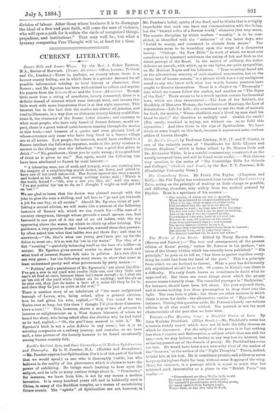CURRENT LITERATURE.
Sussex Folk and Sussex Ways. By the Rev. J. Coker Egerton, M.A., Rector of Burwash. (Sussex Advertiser Office, Lewes ; Trlibner and Co., London.)—There is, perhaps, no county where there is a keener county feeling, nor in which there is a greater demand for all possible information relating to local history or character, than Sussex ; and Mr. Egerton has been well-advised to collect and reprint his papers from the Leisure Hour and the Sussex Advertiser. Though little more than a string of anecdotes, loosely connected, there is a definite thread of interest which runs through most, and invests this little work with more importance than is at first sight apparent. This interest lies in the fact that the stories are almost all genuine, and tend to illustrate, in a way that no elaborate county history could illus- trate it, the character of the Sussex lower classes ; and contrary to what most people, who have only heard of Sussex dulness, would ex- pect, there is a great vein of quiet humour running through the stories in this book,—and humour of a quaint and even piquant kind, of whose existence only those who have long lived in a Sussex village are at all aware. Few people, for instance, would have credited to a Sussex intellect the following repartee, made at the petty sessions in answer to the charge that the defendant "was a good deal given to drink :"—" No, gentlemen ; there you be quite wrong ; it's a good deal of drink as is given to me." Nor, again, would the following tale have been attributed to Sussex by most hearers :—
" A. labouring man, out of work and hungry, went one morning into the surgery of a neighbouring parish doctor, sat down, and asked to have one of his teeth taken out. The doctor opened the man's month and looked at his teeth, but seeing nothing amiss, said : ' Which is the tooth, friend ?'—' Oh, e'er a one you like, sir,' said the man ; `I've got nothin' for 'em to do, so I thought I might as well get rid on 'em " We are glad to learn that the doctor was pleased enough with the joke to give the man a shilling, and tell him to " go and get his teeth a job for one day, at all events." Should Mr. Egerton think of pub- lishing a second edition, we will make him a present of the following instance of Sussex wit, which we can vouch for :—The sons of a country clergyman, through whose grounds a small stream ran, had fastened in one part of it the end of an old ladder, with the top appearing above the water, by which to climb up after bathing. The gardener, a very genuine Sussex humorist, assured them that passers- by often asked him what that ladder was pat there for ; and that he answered,—" Oh, that's what our young gentlemen put up for the fishes to roost on ; it's so wet for 'em in the water." The idea of a fish "roosting "—painfully balancing itself on the bars of a ladder—is unique. Mr. Egerton gives several stories to show how much and what kind of interest Sussex folk take in politics. As a rule this is not very great ; but the following story seems to show that some at least understand pretty well what government by party means :—
"c Politics,' said a parishioner of Mr. Egerton's,' are about like this : Fve got a sow in my yard with twelve little uns, and they little uns can't all feed at once, because there isn't room enough ; so I shut six on 'em out of the yard while t'other six be sucking ; and the six as be shut out, they just do make a hem of a noise till they be let in, and then they be just as quiet as the rest.' "
There is another story of an inhabitant of "the more enlightened borough of Lewes, who, being asked, after a general election, how he had given his vote, replied,—' Well, I've voted for the Tories ever so long, but this time I thought I'd give these Conserva- tives a turn ! ' " This, however, shows a step or two of advance in interest or enlightenment on a West Sussex labourer, of whom we heard the story, who being asked after the election why he had voted as he had, replied,—" Oh, the gen'l'man seemed to wish it." Mr. Egerton's book is not a a‘-ya $t$Alov in any sense ; but it is an amusing companion on a railway journey, and contains, as we have said, a true picture of the homely humour to be found occasionally among Sussex country folk.










































 Previous page
Previous page